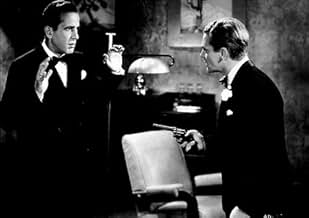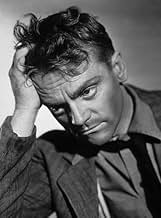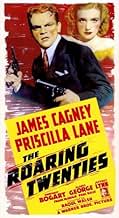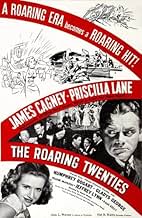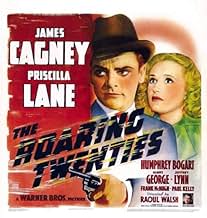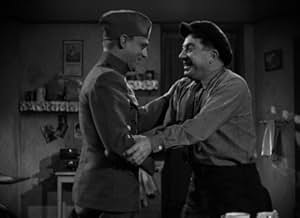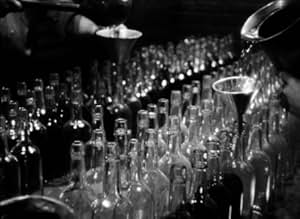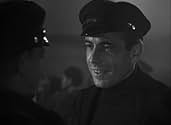AVALIAÇÃO DA IMDb
7,9/10
17 mil
SUA AVALIAÇÃO
Três homens tentam ganhar a vida na América Proibicionista depois de regressarem a casa depois de terem lutado juntos na Primeira Guerra Mundial.Três homens tentam ganhar a vida na América Proibicionista depois de regressarem a casa depois de terem lutado juntos na Primeira Guerra Mundial.Três homens tentam ganhar a vida na América Proibicionista depois de regressarem a casa depois de terem lutado juntos na Primeira Guerra Mundial.
- Direção
- Roteiristas
- Artistas
- Prêmios
- 4 vitórias no total
Elisabeth Risdon
- Mrs. Sherman
- (as Elizabeth Risdon)
Edward Keane
- Henderson
- (as Ed Keane)
Eddy Chandler
- Second Detective
- (as Eddie Chandler)
John Deering
- Narrator
- (narração)
Avaliações em destaque
1939 was such a classic, milestone year for film cinema. So many great films, 'The Wizard of Oz' and 'Gone With the Wind' even being masterpieces. 'The Roaring Twenties' had a lot of talent involved, James Cagney and Humphrey Bogart both had career full of great and more performances and Raoul Walsh (in a different film for him at this stage of his career) sure could direct. Also like the genre 'The Roaring Twenties' fits under.
'The Roaring Twenties' did not disappoint. While it is quite rightly highly regarded today, considered by quite a number of people a genre classic and great representations of both Cagney and Bogart, it is a shame that it was over-shadowed by a lot of other films that year and doesn't get as much attention. 'The Roaring Twenties' may not quite be a film milestone in the way that the best films from such a great year are, but it is a great film in my view and deserves the high praise it gets.
It is not quite perfect, with it being a bit of a slow starter and a film that didn't grab my attention straightaway.
Luckily, 'The Roaring Twenties' got going very quickly. And when it did get going, boy did it blister. The photography is atmospheric and very stylish, the noir-ish lighting also adding to the impact. Was amazed at how evocative the Prohibition setting was. The music is appropriately moody without getting bombastic or syrupy and Walsh's direction is remarkably skillful in how vividly the deceptively gleaming yet very ominous at times setting is portrayed. As well in generating suspense.
Something that 'The Roaring Twenties' does incredibly well in. The script has a sharp wit and tight tautness, with some quite hard to forget quotes. Cagney's last line, one of his greatest, really stands out, the very last line of the whole film likewise. Also really loved the hard boiled edge exchanges of dialogue between Eddie and George, delivering on the entertainment value too. The story is both entertaining and suspenseful, especially in the exciting final third. Cagney's exit is one of his greatest.
Characters are well written, personally found George and especially Eddie (very meaty) very well defined. The acting is just right, Cagney is just terrific in a role that is so perfect for him and one that he played extremely well and better than most in that type of role. Bogart has great laconic intensity and steel, giving one of his best pre-'Casablanca' performances.
Altogether, great. 9/10
'The Roaring Twenties' did not disappoint. While it is quite rightly highly regarded today, considered by quite a number of people a genre classic and great representations of both Cagney and Bogart, it is a shame that it was over-shadowed by a lot of other films that year and doesn't get as much attention. 'The Roaring Twenties' may not quite be a film milestone in the way that the best films from such a great year are, but it is a great film in my view and deserves the high praise it gets.
It is not quite perfect, with it being a bit of a slow starter and a film that didn't grab my attention straightaway.
Luckily, 'The Roaring Twenties' got going very quickly. And when it did get going, boy did it blister. The photography is atmospheric and very stylish, the noir-ish lighting also adding to the impact. Was amazed at how evocative the Prohibition setting was. The music is appropriately moody without getting bombastic or syrupy and Walsh's direction is remarkably skillful in how vividly the deceptively gleaming yet very ominous at times setting is portrayed. As well in generating suspense.
Something that 'The Roaring Twenties' does incredibly well in. The script has a sharp wit and tight tautness, with some quite hard to forget quotes. Cagney's last line, one of his greatest, really stands out, the very last line of the whole film likewise. Also really loved the hard boiled edge exchanges of dialogue between Eddie and George, delivering on the entertainment value too. The story is both entertaining and suspenseful, especially in the exciting final third. Cagney's exit is one of his greatest.
Characters are well written, personally found George and especially Eddie (very meaty) very well defined. The acting is just right, Cagney is just terrific in a role that is so perfect for him and one that he played extremely well and better than most in that type of role. Bogart has great laconic intensity and steel, giving one of his best pre-'Casablanca' performances.
Altogether, great. 9/10
Two of the most famous actors of their day - James Cagney and Humphrey Bogart - are featured here, along with two very interesting women (Priscilla Lane and Gladys George). That foursome would be fun to join anywhere.
Lane is the wholesome pretty girl and George is the tough female bar owner. The latter may not look as good but she delivers the best film noir lines in the movie near the end.
In addition, Jefferey Lynn is good as the clean-cut, nice-guy attorney and Frank McHugh draws laughs as Cagney's buddy (as in real life). Paul Kelly is convincing as a hood.
With this cast, you know you are going to get a well-acted movie. It moves at a good pace, too, with few lulls. The gangster language of the period was fun to hear.
The first time I saw this film I was disappointed. Maybe I expected too much. On the second viewing, I throughly enjoyed it. Having a great DVD transfer on the second viewing didn't hurt, either. It's a nice sharp picture.
Lane is the wholesome pretty girl and George is the tough female bar owner. The latter may not look as good but she delivers the best film noir lines in the movie near the end.
In addition, Jefferey Lynn is good as the clean-cut, nice-guy attorney and Frank McHugh draws laughs as Cagney's buddy (as in real life). Paul Kelly is convincing as a hood.
With this cast, you know you are going to get a well-acted movie. It moves at a good pace, too, with few lulls. The gangster language of the period was fun to hear.
The first time I saw this film I was disappointed. Maybe I expected too much. On the second viewing, I throughly enjoyed it. Having a great DVD transfer on the second viewing didn't hurt, either. It's a nice sharp picture.
It is hard to believe so many truly great films were made in 1939, and I can only guess that the sheer volume of excellent pix from that year is the only reason why THE ROARING TWENTIES does not have truly major classic status. 1939 seems to be cluttered with a plethora of cinematic riches, thus burying this astonishing and entertaining crime film. I also have been roaring (with laughter) at some of the astonishing silly comments also on this film's viewer comments page: from: "Blondell's haircut is worth the price of a ticket" (Joan Blondell is not in this film, sweetie, read the credits!) - to '"Another MGM gem"...hello? pal, the opening of the film has a great big shield with WB stamped on it followed by "Warner Bros Presents". Almost everyone commenting then proceeds to tell the whole story, each one after each one as thought they are the only person writing a comment. Yeesh. I am the only person who firstly reads what is already there in order to NOT duplicate plot points or characters or the same old same old same old? For genuine long lasting flabbergastering I prefer the movie's solid direction by Raoul Walsh the sensational crackling screenplay by Mark Hellinger and Jerry Wald and mostly the truly major performance by James Cagney. This role and it's ride is possibly the best I have ever seen from him, especially in the latter scenes on skid-row. It's a very mean cruel story with Bogart's jawdropping viciousness several points above censorship rulings - all thankfully intact and now in crisp DVD clarity. The production values are equally solid well decorated nightclubs and houses and rooms and very believable and expansive sets and scenes - especially in the WW1 intro. Yes it even has a terrific Citizen Kane style march of time newsreel tone and urgency. This is a genuine gangster masterpiece and well worth finding and sharing with other vintage WB (not MGM) crime buffs. THE ROARING TWENTIES deserves to be one of the most famous gangster films for everyone of its plot, acting , character and production qualities - they are all there on show. I would love to know the budget and the box office. I know the film was a big hit but exactly how big? It deserved to be massive. Also, the best saddest role of a lifetime to the superb and endearing Gladys George as Panama. As if everything else wasn't perfect enough! This film is a collectors must-have. If remade today, it would be exactly the same, such is it's timeless tone and production. In fact it is had to believe it was made 20 years earlier than SOME LIKE IT HOT. Both films look identical. Don't waste another day, put THE ROARING TWENTIES top of your must see list.
"The Roaring Twenties" more or less marked the end of Warner Bros. gangster films popular during the 1930s. For the next few years WWII would form the backdrop of their action films.
This one is full of action and memorable characters due largely to the presence of legendary director Raoul Walsh and its stellar cast.
Three soldiers meet on the WWI battlefield in 1918. One is the all good lawyer Lloyd Hart (Jeffrey Lynn), one the thoroughly bad George Hally (Humphrey Bogart) and the third, an everyman named Eddie Bartlett (James Cagney). Eddie is smitten with a girl, Jean Sherman (Priscilla Lane) who has been corresponding with him from home.
When the war ends Eddie returns to New York and hooks up with buddy Danny Green (Frank McHugh) who is a Gabie. Eddie goes to meet Jean but is disappointed to learn that she is just a teenager. Unable to find work, Eddie is forced to share the driving of Danny's cab. In the meantime, prohibition takes effect and Eddie discovers that bootlegging is the way to get rich. At the onset he meets saloon girl Panama Smith (Gladys George) who turns out to be his only friend.
Fast forward to 1924 and Eddie re-discovers Jean in a chorus line and decides to take a hand in her career. Eddie is now hopelessly in love with Jean much to the dismay of Panama. Jean however, is in love with Lloyd who has turned up as Eddie's lawyer. One night while hijacking a load of booze from rival gangster Nick Brown (Paul Kelly), Eddie meets up with George Hally (what are the chances of that?) who works for Brown. Hally decides to double cross Brown and throw in with Eddie. All the while Eddie is buying up taxis until he has immersed a fleet of 2,000 cabs.
Everything is running smoothly until Hally begins to get his own ambitions and sets up Brown to Murder Eddie. The plot fails. Meanwhile Jean leaves Eddie and runs off with Lloyd and Eddie begins to drink. At the same time come the stock market crash of 1929 and Eddie is ruined. Hally however, didn't play the stocks and buys out Eddie's cab business for a small figure and leaves Eddie with but one cab for himself.
Eddie hits the skids along with the ever faithful Panama until Hally threatens Jean and Lloyd and.............
Cagney as usual dominates the picture. He is his usual cocky Irish tough guy but with character flaws. His love for Jean ultimately is what destroys him. Lane contributes a couple of classic songs (in her own voice) as Jean. Bogart as the thoroughly evil Hally gives us a preview of the Bogart tough guy image to come in the 40s. Gladys George almost steals the picture from Cagney as the tragic Panama and McHugh is sympathetic as Danny.
Oddly enough, for a gangster picture, there are no major characters in respect of crusading cops or district attorneys. All of the action is between the gangsters.
Cagney would not appear in another gangster film for ten years until "White Heat" (1949).
This one is full of action and memorable characters due largely to the presence of legendary director Raoul Walsh and its stellar cast.
Three soldiers meet on the WWI battlefield in 1918. One is the all good lawyer Lloyd Hart (Jeffrey Lynn), one the thoroughly bad George Hally (Humphrey Bogart) and the third, an everyman named Eddie Bartlett (James Cagney). Eddie is smitten with a girl, Jean Sherman (Priscilla Lane) who has been corresponding with him from home.
When the war ends Eddie returns to New York and hooks up with buddy Danny Green (Frank McHugh) who is a Gabie. Eddie goes to meet Jean but is disappointed to learn that she is just a teenager. Unable to find work, Eddie is forced to share the driving of Danny's cab. In the meantime, prohibition takes effect and Eddie discovers that bootlegging is the way to get rich. At the onset he meets saloon girl Panama Smith (Gladys George) who turns out to be his only friend.
Fast forward to 1924 and Eddie re-discovers Jean in a chorus line and decides to take a hand in her career. Eddie is now hopelessly in love with Jean much to the dismay of Panama. Jean however, is in love with Lloyd who has turned up as Eddie's lawyer. One night while hijacking a load of booze from rival gangster Nick Brown (Paul Kelly), Eddie meets up with George Hally (what are the chances of that?) who works for Brown. Hally decides to double cross Brown and throw in with Eddie. All the while Eddie is buying up taxis until he has immersed a fleet of 2,000 cabs.
Everything is running smoothly until Hally begins to get his own ambitions and sets up Brown to Murder Eddie. The plot fails. Meanwhile Jean leaves Eddie and runs off with Lloyd and Eddie begins to drink. At the same time come the stock market crash of 1929 and Eddie is ruined. Hally however, didn't play the stocks and buys out Eddie's cab business for a small figure and leaves Eddie with but one cab for himself.
Eddie hits the skids along with the ever faithful Panama until Hally threatens Jean and Lloyd and.............
Cagney as usual dominates the picture. He is his usual cocky Irish tough guy but with character flaws. His love for Jean ultimately is what destroys him. Lane contributes a couple of classic songs (in her own voice) as Jean. Bogart as the thoroughly evil Hally gives us a preview of the Bogart tough guy image to come in the 40s. Gladys George almost steals the picture from Cagney as the tragic Panama and McHugh is sympathetic as Danny.
Oddly enough, for a gangster picture, there are no major characters in respect of crusading cops or district attorneys. All of the action is between the gangsters.
Cagney would not appear in another gangster film for ten years until "White Heat" (1949).
Most of the famous gangster films were made in the early part of the decade, before the infamous Production Code took all the sex and violence out of the movies, and before they figured out how to make decent movies with sound. The landmark films of the genre like "Little Caesar" and "Public Enemy" are actually kind of poorly made, by modern standards.
Not so this entertaining film, it's full of life and energy and great fun to watch. James Cagney gives a wonderful performance as a dynamic and ambitious man who goes from a barely-eating taxi driver to a gang lord, and back again. Humphrey Bogart gives one of his best pre-Casablanca villain performances, and even generic leading lady Priscilla Land is fresh and likeable.
The only quibble I have with this film is it lacks the immediacy of the earlier "ripped from the headlines" films. It's made about days that had since gone by, and owes more to earlier films than the reality of the day (post-modernism in the thirties?). Still, it's great fun, do see it.
Not so this entertaining film, it's full of life and energy and great fun to watch. James Cagney gives a wonderful performance as a dynamic and ambitious man who goes from a barely-eating taxi driver to a gang lord, and back again. Humphrey Bogart gives one of his best pre-Casablanca villain performances, and even generic leading lady Priscilla Land is fresh and likeable.
The only quibble I have with this film is it lacks the immediacy of the earlier "ripped from the headlines" films. It's made about days that had since gone by, and owes more to earlier films than the reality of the day (post-modernism in the thirties?). Still, it's great fun, do see it.
Você sabia?
- CuriosidadesThis marked the end of James Cagney's cycle of gangster films for Warner Bros. Cagney wanted to diversify his roles: he would not play a gangster again until Fúria Sanguinária (1949), ten years later.
- Erros de gravaçãoWhen Eddie and his men impersonate the Coast Guard, there's a miniature shot of the two boats pulling alongside each other. Nick's rum runner boat that George captains is a much taller boat and its deck is higher above the water than the smaller vessel. Yet when the shot changes to live action and Eddie's crew is throwing mooring lines across to the bigger boat, the decks are now the same height; furthermore, when the men cross from one boat to the other, they merely step over the rail instead of needing to climb up to the taller boat's deck.
- Citações
[last lines]
Panama Smith: He's dead.
Cop: Well, who is this guy?
Panama Smith: This is Eddie Bartlett.
Cop: Well, how're you hooked up with him?
Panama Smith: I could never figure it out.
Cop: What was his business?
Panama Smith: He used to be a big shot.
- ConexõesEdited from Inimigo Público (1931)
- Trilhas sonorasI'm Just Wild About Harry
(1921) (uncredited)
Music by Eubie Blake
Lyrics by Noble Sissle
Played during the opening and closing credits
Also played during the 1922 montage
Sung by Priscilla Lane at the club
Principais escolhas
Faça login para avaliar e ver a lista de recomendações personalizadas
- How long is The Roaring Twenties?Fornecido pela Alexa
Detalhes
- Data de lançamento
- País de origem
- Idioma
- Também conhecido como
- Héroes olvidados
- Locações de filme
- Empresa de produção
- Consulte mais créditos da empresa na IMDbPro
- Tempo de duração
- 1 h 46 min(106 min)
- Cor
- Mixagem de som
- Proporção
- 1.37 : 1
Contribua para esta página
Sugerir uma alteração ou adicionar conteúdo ausente


